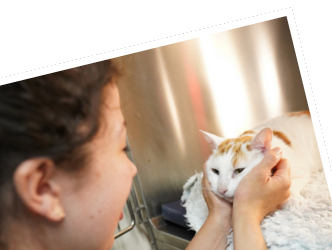
Effective Kitten Litter Training Tips from Daventry Vets’ Nurses
June 21, 2024
Emptying your kitten’s litter box may not be the highlight of your day, but investing time in training your kitten to use it correctly can save you a lot of hassle down the line.Daventry Vets’ nursing team have compiled some invaluable advice on litter training your kitten effectively and instilling good habits for life. Read on for our nursing team’s expert tips:
Contact us for more kitten advice
Litter Box Choice and Care
When it comes to getting the set up right, Daventry Vets’ nursing team have this advice for new kitten owners in Northamptonshire.
First, choose a litter box that mimics a cat’s natural environment by considering factors like size, material, and accessibility. For example, selecting a larger litter box with low sides can resemble the open space that cats prefer for eliminating. Additionally, opting for unscented, clumping litter can replicate the texture and consistency of sand, which many cats prefer for covering their waste. Avoid covered litter boxes, which may make your kitten feel trapped. Don’t use scented liners your kitten won’t like them.
Place the litter box away from food and water bowls and keep it clean. Remove soiled clumps from the litter tray at least twice a day and wash it out at regularly. Cats are sensitive to odours, so a heavily soiled litter box may discourage your kitten from using it.
If you have more than one cat, our Daventry veterinary nurses advise that you should have one litter box per cat, plus an extra box. This means if you have two cats, they should ideally have three litter boxes, three cats should have four litter boxes, and so on. Having multiple litter boxes ensures that each cat has access to a clean and private space for elimination, which can help prevent territorial issues and encourage good litter box habits. The ideal is to have one tray per cat and one extra.
3 Easy-to-follow Litter Training Steps:
- Show your new kitten where their litter tray is as soon as they arrive – you may need to move this to an area your kitten feels comfortable in so keep an eye on them.
- Place your kitten in their litter box after an event i.e. after they have eaten, played and slept.
- Be persistent and patient to ensure good, lifelong habits. Litter training your kitten will not happen overnight but they will eventually learn to associate this time with going to the toilet and will take themselves to the litter box after each event.
Thanks for reading our article on litter training your kitten, we hope you found the advice from our Daventry nursing team helpful.
Help others by sharing our tips with friends and family who may be welcoming a new kitten into their home!



